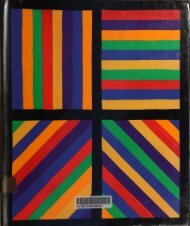SITUATIONISTS AND THE 1£CH MAY 1968
umMYFs
umMYFs
You also want an ePaper? Increase the reach of your titles
YUMPU automatically turns print PDFs into web optimized ePapers that Google loves.
substitutes try to maintain. it .is praxis, even<br />
alienated praxis, which maintains contact with<br />
the totality. By revealing its own fragmentary<br />
character, praxis at the same time reveals the<br />
real totality (reality) : it is the totality being<br />
realised by way of its opposite, the fragment.<br />
In the perspective of praxis, every fragment is·<br />
totality. In the perspective of power, which alienates<br />
praxis, every fragment is totalitarian. This<br />
should be enough to wreck the attempts cybernetic<br />
power will make to envelop praxis in a mystique,<br />
although the seriousness of these<br />
attempts should not be underestimated.<br />
All praxis enters into our project; it enters<br />
with its share of alienation, with the impurities<br />
of power: but we are capable of filtering them<br />
out: We will elucidate the force and purity of acts<br />
of refusal as well as the manipulative maneouvres<br />
of power, not in a Manfchean perspective,<br />
but as a means of developing, through our own<br />
strategy, this combat in which everywhere, at<br />
every moment, the adversaries are seeking one<br />
another but only clashing accidentally, lost in<br />
irremediable darkness and uncertainty.<br />
29 Everyday life has always ben drained<br />
to the . advantage of apparent life, but<br />
appearance, in its mythical cohesion, was powerful<br />
enough to repress any mention of everyday<br />
life. The poverty and emptiness of the spectacle,<br />
revealed by all the varieties of capitalism and all<br />
the varieties of bourgeoisie, has revealed both<br />
the existence of everyday life (a shelter life, but<br />
a shelter for what and from what?) . and the<br />
poverty of everyday life. As reification and<br />
bureaucratisation grow stronger, the debility of<br />
the spectacle and of everyday life is the Ot11Y<br />
thing that remains clear. The conflict between·<br />
the human and the inhuman has also been<br />
transferred to the plane of appearance. As soon<br />
as Marxism became an ideology, Marx's struggle<br />
against ideoJogy in the name of the richness of<br />
life was transformed into an ideological antHdeology,<br />
an antispectacle spectacle Gust as in<br />
avant-garde culture the antispectacular spectacle<br />
is restricted to actors alone, antiartistic art<br />
being created and understood only by artists, so<br />
the relationship between this ideological antiideology<br />
and the function of the professional<br />
revolutionary in Leninism should be examined).<br />
Thus Manicheanism has found itself momentarily<br />
revived. Why did St. Augustine attack the<br />
Manicheans so relentlessly? it was because he<br />
recognised the danger of a myth offering only<br />
one solution, the victory of good over evil; he<br />
saw that this impossibility threatened to provoke<br />
the collapse of all mythical structures and<br />
bring into the open the contradiction between<br />
mythical and authentic life. Christianity offered<br />
the third way, the way of sacred confusion. What<br />
Christianity accomplished through the force of<br />
myth is accomplished today through the force of<br />
things. There can no longer be any antagonism<br />
between Soviet workers and capitalist workers<br />
or between the bomb of the Stalinist bureaucrats<br />
and the bomb of the non-Stalinist bureaucrats;<br />
there is no longer anything but unity in the<br />
chaos of reified beings.<br />
Who is responsible? Who should be shot?<br />
We are dominated by a system, by an abstract<br />
form. Degrees of humanity and inhumanity are<br />
measured by purely quantitative variations of<br />
passivity. The quality is the same everywhere:<br />
we are all proletarianised or well on the way to<br />
becoming so. What are the traditional "revolutionaries"<br />
doing? They are eliminating certain<br />
distinctions, making sure that no proletarians<br />
are any more proletarian than all the others. But<br />
what party is working for the end of the proletariat?<br />
The perspective of survival has become<br />
intolerable. What is weighing us down is the<br />
weight of things in a vacuum. That's what reification<br />
is: everyone and everything falling at an<br />
equal speed, everyone and everything stigmatised<br />
with their equal value. The reign of equal<br />
values has realised the Christian project, but it<br />
has realised it outside Christianity (as Pascal<br />
had supposed) and, above all, it has realised it<br />
over God's dead body, contrary to Pascal's<br />
expectations.<br />
The spectacle and everyday life coexist in<br />
the reign of equal values. People and things are<br />
interchangeable. The world of reification is a<br />
world without a centre, like the new prefabricated<br />
cities that are its decor. The present fades<br />
away before the promise of an eternal future<br />
that is nothing but a mechanical extension of the<br />
past. Time itself is deprived of a centre. In this<br />
concentration-camp world, victims and torturers










